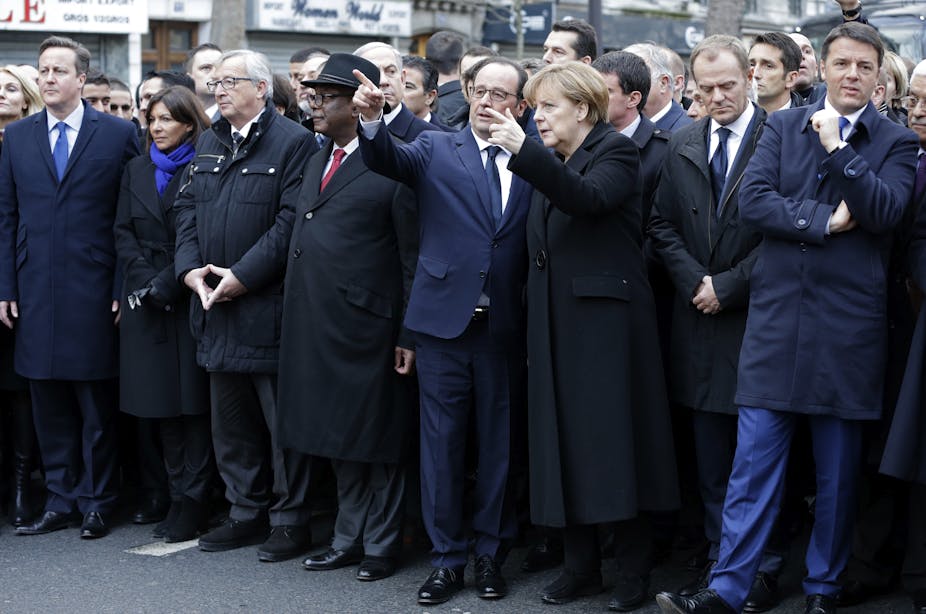After three deranged men murdered 17 people in Paris over the course of three days, millions took to the streets to express solidarity with the victims’ families and friends, intolerance of hatred and terrorism, and to publicly acknowledge the country’s distress. Social media was alive with defences of freedom of speech and freedom from tyranny.
And in a striking show of solidarity, the world’s political leaders were out in force too, uncomfortably linking arms.
A shame that this display of support for the notion that we will not walk in fear was marred by such dreadful hypocrisy. My own response to the wind-bagging on the Charlie Hebdo attacks and other murders was less than charitable, but it still must be said: the opportunism on display from the political leaders who called for more mass surveillance in response to the attacks was staggering.
Push it through
As David Cameron and Theresa May see it, now is the time for promoting a re-introduction of the snoopers charter and railroading through the Counter-Terrorism and Security Bill which could result in the jailing of university staff refusing to report students suspected of undefined extremism.
For his part, French prime minister, Manuel Valls, in an unwelcome echo of the appalling failures of the Blair–Bush era, has called for a war on terrorism.
David Cameron will soon fly to the US to discuss the Paris murders with Barack Obama, as well as plans for enhanced intelligence collaboration. Strange since, if the Snowden revelations are to be believed, it’s hard to see how the two countries’ surveillance efforts could be any closer entwined.
Note to David Cameron
In light of all the politicking/electioneering, I do have a question or two for Mr Cameron and perhaps a suggestion or two for the mainstream media hacks who actually get access to him.
Now he’s been to Paris to stand up for free speech, perhaps Mr Cameron will think about repealing laws such as section 127 of the Communications Act 2003, which criminalises offensive speech.
Equally, perhaps he might care to clarify how exactly the further expansion of mass surveillance in the UK is supposed stop known terrorists committing murder. After all, we already have mass surveillance in the UK, as a cursory search for “Snowden”, “Tempora”, “OpticNerve” or “DRIPA” will make clear.
The French intelligence and security services could not keep track of the Kouachi brothers, known extremists, to a sufficient degree to prevent the Charlie Hebdo attacks. Likewise Amedy Coulibaly who murdered a police officer on the street and four others in a supermarket.
France has blanket electronic surveillance and armed police. It even has the ID cards so beloved (and so tantalisingly out of reach) of Tony Blair and his succession of home secretaries. It has an inquisitorial justice system, the purveyors of the Counter Terrorism and Security Bill’s “prevent duty” seem to be hankering after. It arguably also has a constitution that mass surveillance, at least, offends against.
None of it was enough to stop the Kouchais and Coulibaly.
Absolute security and guaranteed prevention of these kinds of extreme acts is impossible. Mass surveillance cannot and will not move us any closer to that goal. Counterintuitively, it actually makes us all less secure. Diverting limited intelligence resources from pursuing truly dangerous suspects, in order to watch everyone, is a really bad idea. If it takes a conservative 20 intelligence and security staff to monitor a suspect 24/7, the state would need to figure out how to muster the 1.2 billion staff and associated resources to keep tabs on the UK’s 60m-plus people.

And if it can’t monitor all of us 24/7, the government will need ways to decide who and how many to watch, in addition to the known dangerous individuals it’s already unable to keep track of.
Too much
These questions apply to all the organs of society. How much intelligence services effort will be diverted into keeping an eye on grumpy academics disinclined to engage in their “prevent” duty, outlined under section 21 of the Counter Terrorism & Security Bill, to report students who voice non-standard views?
There is at least a faint ray of hope there. To little notice, in the same week as the Paris attacks, the Parliamentary Human Rights Joint Committee issued its fifth report. By coincidence, it happened to be a legislative scrutiny of the Counter-Terrorism and Security Bill. In it, the committee criticises the Bill as an attack on freedom of expression and academic freedom. It even recommends universities be exempt from the section 21 duty to prevent terrorism:
In our view, because of the importance of freedom of speech and academic freedom in the context of university education, the entire legal framework which rests on the new ‘prevent’ duty is not appropriate for application to universities. We recommend that the Bill be amended to remove universities from the list of specified authorities to which the new duty applies.
That might possibly be good news for universities and irascible academics. It’ll do nothing for the rest of the public servants burdened with this ill-defined, liberty-eroding duty to prevent terrorism.
If we are serious about our defences of freedom in the face of terror, we cannot consider it respectable or defensible to require everyone in public service to spy on each other and the rest of the population.
If you doubt that and still believe in the power of mass surveillance to provide a world of perfect security, there is a bridge in London a veritable avalanche of merchants of confidence might consider offering you, at a reasonable discount.

